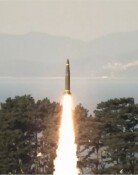Terror Possibility Threatens US Economy
The US economy is under severe constraints. Economic indicators are not showing signs of recovery and concerns over a terrorist attack at home are rising. Furthermore, overall financial markets are hanging onto uncertainty after the US virtually discarded its strong dollar policy.
Languishing US economy
It was April 1 when US President George W. Bush declared victory in the Iraq war. The domestic economy, however, has yet to show clear signs of recovery as expected, in the past 20 days, during which the war clouds cleared and oil prices dropped below 30 dollars a barrel.
Warnings of deflation have gained momentum as manufacturer indices, released by the Institute for Supply Management (ISM), threatened to shrink along with declining consumer prices. The Consumer Sentiment Index or CSI showed signs of improvement last month, according to the report on May 19 (local time) by the Conference Board. Yet, the leading indicator only showed a meager 0.1% point increase from the previous month. This offers bleak prospects for the US economy.
Uncertainties over a terrorist attack
Within two weeks after the war in Iraq, a series of terrorist attacks against US facilities have been witnessed in the Middle East - Saudi Arabia, Morocco, and Palestine and in Africa, all presumably orchestrated by Islam extremists. Although the US homeland has not been attacked, the Bush administration warns of a high possibility of a terrorist attack on its soil. Fear of terrorism has indeed replaced Iraqi uncertainties.
Economists agree that a terrorist attack on the nation will pose the largest threat to the ailing US economy. Shin Min-young, a researcher at the LG Economic Research Institute, predicts that an attack would drag down the dollar as well as stock prices, thereby inflicting damage on global financial markets as well as riven consumer confidence.
Lee Won-gi, managing director at Merill Lynch, Korea said: Financial markets as well as investor and customer confidence would be directly affected. He added that it is hard to foresee how long and how severely these sectors would stay damaged.
The US economic recession will surely affect the Korean economy in the long run, which has been propped up by exports to the US and China, amidst sluggish domestic markets.
Abandoning the strong dollar policy
Since Treasury Secretary John W. Snow made comments that the country would accept a weaker dollar at the end of last week, the greenback has picked up speed on its descent. The dollar dropped yesterday in Tokyo, exchanged at 1.1740 euros, signaling further losses.
Discarding a strong dollar is hardly a decision made by the US government, which aims to revitalize local manufacturers under threat of deflation. Yet, the strategy can turn out to be negative rather than a blessing if investors, losing out on currency exchanges, get into the habit of selling off dollar-denominated assets.
Rae-Jeong Park ecopark@donga.com
Headline News
- Pres. Yoon addresses the nation at a press conference
- LX Group chairman gifts 100 million won to employee family welcoming quadruplets
- Tax-exempt shared offices in rural areas misused as tax havens
- President-Elect Trump promises 'peace through strength'
- French gambler wins 67.2 billion won by betting on Trump’s election win







